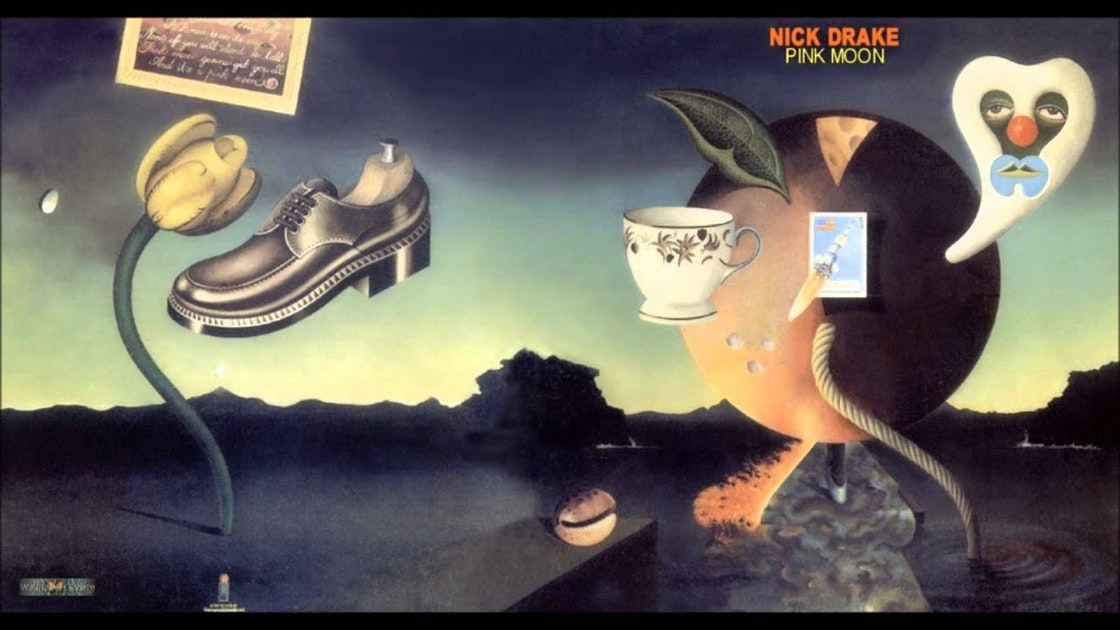
Music lovers everywhere, don your party hats, dig out your best vinyl and prepare to get it spinning: it's National Album Day! Returning for its seventh annual event, NAD celebrates the concept of the long-player as a format in all of its guises and glories, from classic vinyl all the way through to chunky cassettes and shiny CDs.
This year, National Album Day is partnering with BBC Radio 2 to "celebrate incredible albums by Great British groups", and we thought we'd get in on the act by compiling our list of the best (or our favourite) British albums for testing your hi-fi system. It's an eclectic mix of music, but each record is a personal recommendation from one of our team that we think will give your hi-fi the workout it craves. If you're looking for an excuse to expand your vinyl collection or add another CD to the shelf, you've found it.
The Cure – Disintegration (1989)
The Cure are a hot topic at the moment, with the band’s new album Songs Of A Lost World set to come out alongside a fresh supporting tour in 2025. No one is more excited about this prospect than I am, as from the day I first heard them, I’ve been utterly obsessed with The Cure.
Whether it’s one of the band’s bopping pop songs such as Love Cats or the beautifully romantic ballad Just Like Heaven – which I played at my wedding – The Cure has always been a staple entry in my list of favourite bands of all time. Yet of all their vast and diverse catalogue of stellar tunes, it’s the group's 1989 masterpiece Disintegration to which I return the most often.
The gloomy, atmospheric album is one of the group's most cohesive and beautiful to date. From the heart-wrenching, equal parts sweet, equal parts tear-jerking Pictures Of You at its start to the later thumping titular track Disintegration – which has one of The Cure's best bass parts ever – it’s a fantastic album.
It’s also a key part of the band’s history that showcases how its songwriting matured over the years, with every track featuring complex layered compositions full of hidden detail and subtle nuance. I often listen from start to finish, especially on my much-loved vinyl copy, because of this.
Words by Alastair Stevenson
Listen to Disintegration on Tidal
The Streets – A Grand Don't Come for Free (2004)
The beauty of Mike Skinner’s second studio album, in case you didn’t already know, is that the whole thing plays out like a TV drama. Think of the 11 tracks as individual episodes, each one helping to tell the story of loss, relationships, a broken TV and a missing £1000. You’re taken on a rollercoaster ride of emotions from the hopeful, upbeat tempo of Could Well Be In to the slightly darker, more clubby tone of Blinded By The Lights to the wonderfully sad, raw emotion of Dry Your Eyes.
You even get two different endings for the price of one, thanks to the genius of the last episode; Empty Cans. It also helps that every one of the aforementioned songs also makes for a great test track for your hi-fi or headphones. I regularly find myself dipping in to listen to a few of my favourite chapters and more often than not can’t resist going all the way through to the end. A genius piece of writing.
Words by Andy Madden
Listen to A Grand Don't Come for Free on Tidal
Muse – Absolution (2003)
Muse's nine-strong catalogue of studio albums is startlingly, almost willfully eclectic. Starting off as little more than scratchy alt-rockers imitating the equally scratchy, equally alternative stylings of early Radiohead, Muse's rapid and bizarre evolution took them from piano-thumping arena rock through to space opera and even electro, all the while incorporating influences as far-ranging as metal, dubstep, disco, funk and classical.
For a more accessible entry point into the ludicrous world of our favourite Teignmouth trio, Absolution should be your place to start. Hard and heavy enough to satisfy angsty headbangers but full of enough invention and refinement to keep proper musos satisfied, it's the happy middle-ground during which Muse were starting to find their voice as a creative force. Hysteria remains a hardy perennial for testing bass agility, whereas Apocalypse Please and Time Is Running Out provide sonic thrills in spades.
Words by Harry McKerrell
Listen to Absolution on Tidal
Led Zeppelin – Led Zeppelin IV (1971)
If you talk to anyone about British music, Led Zeppelin is certain to be one of the first bands to come to mind. It's certainly the case for me as, like most kids born in the ’80s, the band’s fourth album, and its most famous song Stairway to Heaven, was a staple sound in my home and during long car rides. The track's opening, sorry for the cliché, is also one of the first things I taught myself on guitar.
The reason IV is one of my choices on this list, though, is that it’s so much more than its most famous song. The acoustic track, Going To California is one of the band’s best, while When the Levee Breaks is a great showcase of Led Zeppelin’s technical genius when it came to recording. Guitarist Jimmy Page is famous for his innovations in this area, famously playing a guitar with a violin bow to create a cacophony of sound and using clever tricks like recording guitar parts in a tiled bathroom to create a reverb effect – a trick guitarists generally use expensive digital pedals or studio wizardry to replicate in today’s world.
Words by Alastair Stevenson
Listen to Zed Zeppelin IV on Tidal
The Rolling Stones – Aftermath (1966)
The Stones' fourth UK release was their first 'best album' – not only the first made up of all-original Jagger/Richards songs, but one which featured an empire's wealth of exotic ideas and interesting orchestration. Brian Jones, concerned that his place in the Stones was increasingly shaky (not least because his songwriting and guitar contributions were by this point minimal), repositioned himself as a 'multi-instrumentalist'. While Mick and Keef were the real heart and soul of the band, with Richards' guitar playing sublime throughout, Jones' various contributions of sitar, vibraphone, marimba, Japanese koto, and anything else he'd picked up, pushed the band's experimentalism in fascinating directions.
Consequently, Aftermath was one of the first records to make the album format, rather than the single, the main artistic focus in popular music. That alone makes it a hugely significant entry in any list of great albums. Never less than provocative, the album's diverse and distinct musical threads – from the sitar and rhythmic power of Paint It Black (US version only) to the dulcimer tones of the baroque Lady Jane and Under My Thumb's driving marimba melody – provide a wealth of sonic textures for a good hi-fi system to paint (black) on its soundstage's canvas.
Words by Chris Burke
Listen to Aftermath on Tidal
Radiohead – The Bends (1995)
As is the case with their rocking compatriots Muse, selecting a Radiohead test track or simply opting for which one to add to your swelling vinyl collection is less about which record to pick and more about where's the best place to start. We waffle on a lot about Radiohead and their test room talents, yet there are still many curious listeners who find the Oxford quartet's robust back catalogue a little...intimidating.
If you're finding Amnesiac a touch too esoteric or Kid A just a smidge too cerebral, it's worth going back to basics with the album that marked Radiohead's ascent to global domination. 1993's Pablo Honey had put the band in the spotlight thanks to the explosive success of Creep, but The Bends is where things begin to coalesce into something approaching true greatness. Whether it's the simple beauty of Fake Plastic Trees, the anthemic adrenaline of Just or the whirlwind drama of the title track, you and your speakers are bound to find something to enjoy.
Words by Harry McKerrell
Listen to The Bends on Tidal
Nick Drake – Pink Moon (1972)
Nick Drake was one of my first introductions to folk music and remains my favourite artist in the genre, so it should come as no surprise that perhaps his most iconic album, Pink Moon, makes this list. The artist’s third, and sadly final, record was released in 1972.
The album has a more polished feel than some of Drake's earlier recordings and is fll of tracks that do true justice to Drake's wonderfully adept acoustic guitar skills and emotive but vulnerable vocal style – which are on full display from start to finish, given the album’s focus on Drake’s ongoing battle with depression.
Whether it’s the album’s melancholic but hopeful titular track or the rolling plucked guitar of its reflective closer From The Morning, Pink Moon is an album every music fan should listen to at least once in their lifetime.
Words by Alastair Stevenson
Listen to Pink Moon on Tidal
Fleetwood Mac – Tusk (1979)
An at-times uncorked creative outpouring, the double-album follow-up to the obviously brilliant Rumours has been described by John McVie as sounding like the work of three solo artists. But then, that tension was seemingly what made the band work so well. So you get your Lindsey Buckingham tracks (at the time he was infatuated with Talking Heads and the burgeoning new wave), as distinct from Christine McVie's as-ever beautiful balladry and Stevie Nicks' grandiose, almost proto-goth anthems – and the result is a patchwork classic.
From the rhythmically dense What Makes You Think You're The One to the shimmering Never Forget and the haunting Sisters Of The Moon, there's a lot of painstakingly considered musicality on display here for a good system to enjoy. John McVie's undulating basslines, Mick Fleetwood's pounding toms and delicate snare work, Christine and Stevie's achingly beautiful vocal interplay and Buckingham's silvery guitar work should all be kept distinct, and the whole well-organised. The title track is a particular joy; Tusk's pounding jungle-drum-style multi-tracked drums and percussion should hit just right, while you should be clearly able to pick out any of the various 'Tarzan'-style chants and animalistic noises in the background too.
Bonkers, and brilliant.
Words by Chris Burke
Listen to Tusk on Tidal
Massive Attack – Mezzanine (1998)
It would be an act of wanton disrespect, nay ingratitude, to omit Mezzanine from almost any rundown concerned with compiling records fit for testing out headphones and hi-fi. British or otherwise, Mezzanine occupies a space in music history that, while it doesn't quite stand alone, sees it matched by very few comparable peers. As a test record, it's as essential as anything that was ever laid down by Marvin Gaye, The Beatles or Bob Dylan. Big words, but true.
Skim through a small assortment of What Hi-Fi? reviews and you'll find endless references to Massive Attack's masterwork, with repeat performances from Angel, Teardrop and Risingson adorning our prose in the way that repeated epithets helped pad out those tricky passages in Homer's Odyssey and Iliad. A masterclass in production, Mezzanine remains one of the moodiest, most absorbing records of its kind, enrapturing listeners with its bolder harmonies and flavours while delighting serious aficionados with the hidden details and textures to make a sound engineer go weak at the knees.
No wonder we're still listening to it nearly 30 years on.
Words by Harry McKerrell
Listen to Mezzanine on Tidal
MORE:
These are the best British rock songs for testing your system
Enjoy 10 iconic albums from 1984 celebrating their 40th anniversary this year
And 10 iconic albums celebrating their 30th anniversary this year







